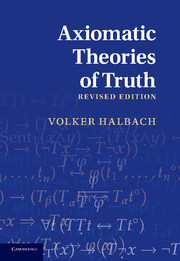Book contents
- Frontmatter
- Contents
- Preface
- Part I Foundations
- Part II Typed truth
- Part III Type-free truth
- 10 Typed and type-free theories of truth
- 11 Reasons against typing
- 12 Axioms and rules
- 13 Axioms for type-free truth
- 14 Classical symmetric truth
- 15 Kripke–Feferman
- 16 Axiomatizing Kripke's theory in partial logic
- 17 Grounded truth
- 18 Alternative evaluation schemata
- 19 Disquotation
- Part IV Ways to the truth
- Index of systems
- Bibliography
- Index
19 - Disquotation
from Part III - Type-free truth
Published online by Cambridge University Press: 05 February 2015
- Frontmatter
- Contents
- Preface
- Part I Foundations
- Part II Typed truth
- Part III Type-free truth
- 10 Typed and type-free theories of truth
- 11 Reasons against typing
- 12 Axioms and rules
- 13 Axioms for type-free truth
- 14 Classical symmetric truth
- 15 Kripke–Feferman
- 16 Axiomatizing Kripke's theory in partial logic
- 17 Grounded truth
- 18 Alternative evaluation schemata
- 19 Disquotation
- Part IV Ways to the truth
- Index of systems
- Bibliography
- Index
Summary
The reader may wonder why I have left the discussion of type-free disquotation systems of truth until the end of the part on type-free theories, given that in the part on typed theories the disquotational theories come before all other typed theories.
In both parts I have roughly followed the strategy of discussing simpler and weaker theories first before proceeding to the stronger systems. But while typed disquotational theories such as TB and UTB are weaker than compositional theories such as CT and PT, type-free disquotational systems of truth are not necessarily weaker than type-free compositional theories. This is not to say that type-free disquotational theories are all very strong. Rather the type-free disquotational truth theories do not form a very homogenous class of theories: the strength of the consistent systems of type-free disquotation truth ranges from theories conservative over Peano arithmetic to theories of arbitrary strength, as will be shown below.
A reason for the disparity between type-free disquotational systems is that it is not always clear what the good systems are. Type-free disquotational system are not easily obtained by generalizing typed disquotational theories: generalizing the theory TB to a type-free theory is not as easy as generalizing CT to FS or PT to KF.
- Type
- Chapter
- Information
- Axiomatic Theories of Truth , pp. 253 - 272Publisher: Cambridge University PressPrint publication year: 2014



